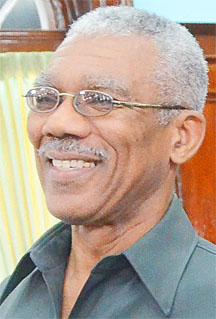Leader of the Opposition David Granger has said that the opposition parties are seeking external assistance in drafting legislation to bring to the National Assembly and that President Donald Ramotar cannot behave “like a dictator” and reject bills brought by them.
He made the comment while speaking at a press conference held at Congress Place, Sophia yesterday to mark the 55th anniversary of the PNCR, for which a month of activities has been planned.
“We will seek the support of international agencies and we have already spoken to the United Nations Development Programme (UNDP) [for help with the drafting of legislation],” he said.

President Donald Ramotar has said publicly that he would be unprepared to support any legislation that did not have the input of the government. “He cannot behave like a dictator,” Granger, however, said yesterday.
“We will ensure that the legislative agenda of the two opposition parties are harmonised so that the will of the people will be heard,” he said, adding, “We are confident that we will be able to maintain the cooperation between the two parties.”
Granger, also leader of the PNCR, said that it is with a view to avoiding another collision with government, as was the case with the opposition-led budget cuts, they are reaching out to the Ramotar administration with the hope that the parties could consult.
“Government has declined to appoint the tripartite budget committee which has been proposed since December 2011. It did not appoint it in 2011 and even after our request this year, it seemed determined not to appoint it again. We are dissatisfied with that because we feel that a tripartite committee would have been an advance towards national unity… an advance towards resolving some of the public finance challenges that we encountered. So, I am disappointed and I am convinced that unless there is such a committee, we are going to have problems with the 2013 national budget,” Granger said.
He added that in the face of the government failing to reach out to the hand of partnership from the opposition, then the combined majority will push ahead to ensure the “will of the people” is done.
He said too that the opposition will be pushing for a review of the recommendations of the Disciplined Forces Commission when the Parliament resumes.
Granger also spoke of what he described as the large number of children that drop out of school because of flaws in the education system. Among these flaws are the overcrowding of schools and shortcoming in the standard of trained teachers, the latter of which he blamed on the University of Guyana’s failing to properly prepare teachers. He said that there are also issues of shortage of teachers and shortage of food at faraway schools as contributing to the poor lot of students.
“Unless the problems at the University of Guyana are solved, we will not be able to fix the problem of teachers,” he said.
Granger said that in addition to fixing the problem of the university, there needs to be better remuneration for teachers. “If teachers are treated better by the Ministry of Education more of them will remain in Guyana. The government is not capable of [remedying] the problem.
Granger said that the PNCR’s first commitment today and its challenge in the future, is to rectify the national education system so that “every Guyanese child can receive a good education.”
“The PNCR is proud of its achievements in education while in government,” Granger added. “It expanded educational opportunities by constructing the University of Guyana and the Cyril Potter College of Education campuses; by building multilateral, primary, secondary and community high schools in rural and hinterland regions; by inaugurating a comprehensive programme of scholarships; by increasing the number of school places; by producing and distributing textbooks and by introducing free education from nursery to university,” Granger said.
He said too that the party has also committed to fortifying local government systems “so that our communities could be administered more equitably and democratically.”




